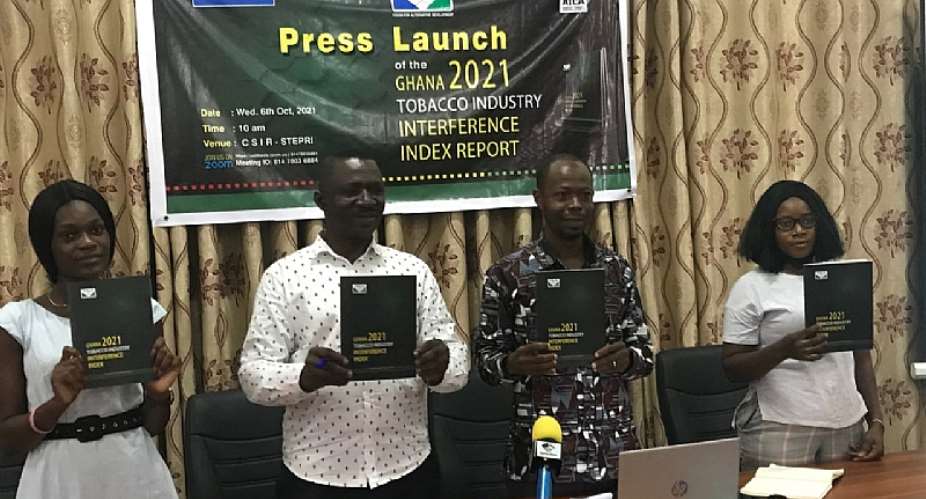The Vision for Alternative Development (VALD) has reiterated its call to government of Ghana to ban the sale of single-stick cigarette in the country.
It wants government to also make tobacco products very expensive to curb its usage.
According to Mr. Labram Musah who is Executive Director at VALD, the sale of cigarette in single stick in a way promotes its use especially when it means even the poorest Ghanaian can make a purchase with as little as GHS0.20p.
Lamenting how the players of the tobacco industry are taking advantage to make money at the expanse of the health hazards, the VALD director stresses that it is about time government makes it difficult for persons to get their hands on the products.
“The government through the establishment of an Inter-agency Coordinating Committee or under the chairmanship of the Minister of Health must prioritize surveillance and monitoring of the activities of the tobacco industry in the country to inform evidence-based policymaking. In light of the evidence gathered in this report, it appears there is a clear low commitment and understanding of the TC laws which to a large extent benefits the tobacco industry.
“For instance, the continuous sale of tobacco in single sticks despite a ban on such, the influx of illicit tobacco products in the market, the 'Duty-Free' tobacco products at the country's ports, among others, all amounts to huge benefits and incentives to the tobacco industry while the country loses huge sums of revenue,” Mr. Labram Musah said to argue his point.
The VALD director hammered on this during the launch of the Ghana 2021 Tobacco Industry Interference Index Report.

The Vision for Alternative Development with the support and partnership of the Global Centre for Good Governance in Tobacco Control (GGTC) and the Africa Tobacco Control Alliance (ATCA) has come out with the report to inspire change.
The report presents findings of the tobacco industry attempts and interference in government efforts to develop tobacco control policies, strengthen measures to control tobacco use and overall implementation of the WHO FCTC and its protocols.
The Ghana report is expected to form part of the Global Tobacco Industry Interference Index aimed at documenting how public health policies are protected from the industry’s subversive efforts, and how the government have pushed back against this influence.
Currently, the government's weak approaches to policy adherence have provided some leniency and boost to the tobacco industry in Ghana.
In addition to the duty-free arrangements at the country's ports that permit government officials and diplomats to carry tobacco products, without paying any duty, there is also the weak capacity of tax and customs agencies to fight the illicit trade of tobacco in Ghana which has played to the advantage of the tobacco industry.
As parts of the recommendations in the report, VALD wants the government to work with CSOs and other stakeholders to develop a code of conduct to guide the conducts of all public officials, to restrict or ban government agencies and officials from receiving any form of support from the tobacco industry and make known their engagements and interactions with the Tobacco Industry.
VALD also wants the government to mandate the Ministry of Finance to regularly review the price of tobacco products and propose appropriate measures to effectively regulate the affordability and access to tobacco products.
The advocacy organisation recommends that the government also adopts a Specific Tax regime to replace the current Ad-valorem tax regime for tobacco products - the current price at which tobacco is sold is unjustifiably too low even when sold in packs [GHS2 for a pack containing 10 sticks].
Read all the recommendations in the report below:









 'Kill whoever will rig Ejisu by-election' – Independent Candidate supporters inv...
'Kill whoever will rig Ejisu by-election' – Independent Candidate supporters inv...
 Ashanti Region: ‘Apologize to me for claiming I owe electricity bills else... – ...
Ashanti Region: ‘Apologize to me for claiming I owe electricity bills else... – ...
 Ghana is a mess; citizens will stand for their party even if they’re dying — Kof...
Ghana is a mess; citizens will stand for their party even if they’re dying — Kof...
 Internet shutdown an abuse of human rights — CSOs to gov't
Internet shutdown an abuse of human rights — CSOs to gov't
 Free SHS policy: Eating Tom Brown in the morning, afternoon, evening will be a t...
Free SHS policy: Eating Tom Brown in the morning, afternoon, evening will be a t...
 Dumsor: A British energy expert 'lied' Ghanaians, causing us to abandon energy p...
Dumsor: A British energy expert 'lied' Ghanaians, causing us to abandon energy p...
 What a speech! — Imani Africa boss reacts to Prof. Opoku Agyemang’s presentation
What a speech! — Imani Africa boss reacts to Prof. Opoku Agyemang’s presentation
 Dumsor: Tell us the truth — Atik Mohammed to ECG
Dumsor: Tell us the truth — Atik Mohammed to ECG
 Dumsor: Don't rush to demand timetable; the problem may be temporary — Atik Moha...
Dumsor: Don't rush to demand timetable; the problem may be temporary — Atik Moha...
 Space X Starlink’s satellite broadband approved in Ghana — NCA
Space X Starlink’s satellite broadband approved in Ghana — NCA
